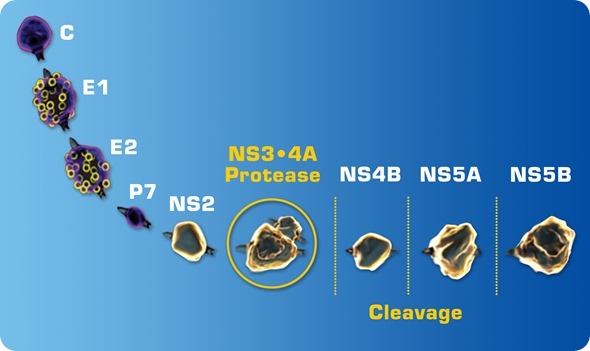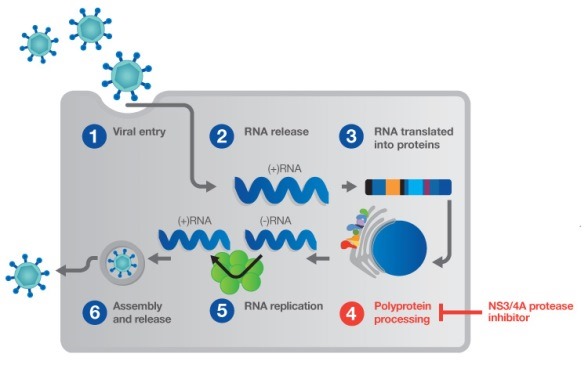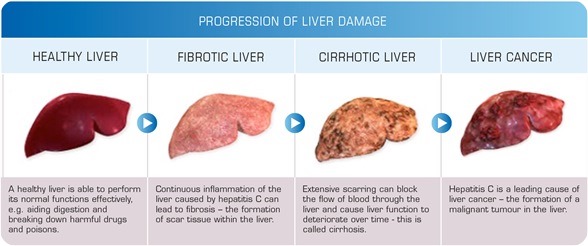Genotype 1 is, worldwide, the most prevalent genotype of the hepatitis C virus. It accounts for around seventy percent of all hepatitis C infections.
With the introduction of protease inhibitors, it became known that the subtypes 1a and 1b make a difference in terms of treatment response.
Subtypes 1a and 1b are genetically closely related. They share seventy to eighty percent of their genome. However, 1a turned out to be more difficult to treat than 1b, which is easier to treat.
That was also the case with the already approved protease inhibitors, and still is the case with the second generation of protease inhibitors (PIs) like faldaprevir or other second generation PIs that are in late stage development. And it applies for interferon based as well as interferon-free treatments.

Faldaprevir's target in viral polyprotein processing.
*Please note faldaprevir (BI 201335) is an investigational compound and not yet approved. Its safety and efficacy has not yet been fully established.
Source: Boehringer Ingelheim
Do genotypes 1a and 1b affect equal numbers of people, or is one more common than the other?
It is regionally very different. In the US, genotype 1a is more prevalent where it accounts for roughly seventy percent of genotype 1 infections.
In Europe, there is slightly more genotype 1b. So there’s roughly a sixty-forty split, with sixty percent being genotype 1b, forty percent 1a.
If you go further East the prevalence of 1b becomes nearly the only genotype 1. So in Japan, in China, and in large parts of Asia, genotype 1b is basically the vastly prevailing or the only genotype 1 subtype.

Hepatitis C virus travelling in the bloodstream.
Source: Boehringer Ingelheim
Why is eliminating injectable interferon from HCV treatment regimens highly desirable?
I have been working on hepatitis C treatment for many years and it is not only subcutaneous injections that make patients uncomfortable. Interferon really makes patients sick for the whole course of treatment and with current treatments this can be as long as twenty four or forty eight weeks, so nearly one year.
Patients feel like they have the flu, with fever, myalgia, chills, and many other symptoms. Also their neuro-cognitive function is reduced. They have low blood cell count that can lead to infections and to severe bleedings. They suffer from psychiatric side effects like severe depression. There are suicides associated with treatment with interferon.
So interferon is really a trouble-maker for patients; it makes patients sick for the duration of their treatment and it is less effective than the oral treatments that are to come. Treatment lasts longer and there is a high chance patients won’t be cured at the end. In contrast, current triple therapies the next generation triple therapies, as well as the future interferon-free treatments, offer shorter treatment duration and higher cure rates.

Faldaprevir* Protease Inhibitior Mode of Action.
*Please note faldaprevir (BI 201335) is an investigational compound and not yet approved. Its safety and efficacy has not yet been fully established.
Source: Boehringer Ingelheim
How did your interferon-free combination treatment originate and what stage of development is it currently at?
It’s actually based on the knowledge of HIV and tuberculosis treatment; where by combining different oral drugs with a different mode of action it is possible to control or eliminate the virus or mycobacteria.
In HCV, we had two different mode-of-action drugs in late stage development that we combined. We had actually thought we may possibly have a forty-five percent cure rate, which would still have been a very attractive cure rate for patients without any treatment options.
Up to fifty percent of hepatitis c patients right now do not tolerate interferon or have contra-indications against interferon.
But then in our phase two studies we found out that by focusing on the easier-to-treat genotype 1b patients, eighty five to ninety five percent of patients can be cured. This makes this combination very attractive as an alternative to replace interferon-based treatments.
And with this interferon-free treatment, we are currently in phase III development.
Please can you tell us about the recent Phase IIb study into the efficacy and safety of this combination treatment?
This is our second phase IIb trial. Initially (in the SOUND-C2 trial) we tested our interferon-free treatment regimen of faldaprevir, deleobuvir and ribavirin in a large study. We had 362 patients, including patients with liver cirrhosis and all stages of liver disease.
We found that genotype 1a patients are indeed difficult to treat, achieving lower cure rates. That would have been attractive maybe three, four years ago, but not nowadays.
But in this study genotype 1b patients had a cure rate of eighty-five percent.
Then we modified the regimen. We shortened treatment from twenty eight to sixteen weeks in SOUND-C3, which is the study we just published at the Asian Pacific Liver Conference (APASL) in June.
We also dropped a so-called induction dose. So in the old regimen, we had a high dose of our polymerase inhibitor and this was not so well tolerated, as we found out.
So we dropped this, we shortened treatment and we found in genotype 1b patients ninety five percent achieved viral cure. But it turned out that in the more difficult to treat population of genotype 1a patients, only two of seventeen patients were cured. And that confirmed our decision to focus on genotype 1b patients with this regimen.

Progression of liver damage caused by infection with hepatitis C.
Source: Boehringer Ingelheim
What were the results of this study and what do they indicate?
The very high cure rates of ninety five percent confirm our decision to focus on genotype 1b patients with this regimen.
We dropped genotype 1a patients from this regimen. However we are currently investigating a third compound in combination with our interferon free combination with which we strive to address genotype 1a patients.
The tolerability was very good. This was as expected from interferon-free treatment. We saw only minor effects on the red blood cells, which was due to the ribavirin component of the regimen, but we didn’t see any effects on white blood cells or platelets.
We did see mostly mild adverse events like mild rashes or nausea, which were the most common side effects.
Did any patients experience serious adverse events during the trial?
Only two patients had to discontinue treatment for adverse events and only one patient reported a serious adverse event (SAE). So overall, I think we can say that this is very good tolerability.
What serious adverse event did the patient experience?
The SAE patient was a patient who had severe dehydration. He was hospitalized to get some infusions and discontinued HCV treatment early after 6 weeks of treatment. However the condition was managed and resolved and the patient recovered completely from the event but also from his hepatitis C.
What are your plans for the future?
For genotype 1b patients we are in the middle of our phase III evaluations. We are expecting results early next year.
We have three on-going phase III trials:-
-
One in treatment-naive genotype 1b patients.
-
One in a treatment-naive population that includes interferon ineligible patients, which are patients who have contra indications to interferon based treatments. So these patients have currently no treatment option at all.
-
We have a third trial that goes to the highest unmet medical need population, which are patients with decompensated liver cirrhosis.
The first two trials also include patients with compensated liver cirrhosis, but the third trial really addresses the late stage liver cirrhosis, or decompensated liver cirrhosis. These are patients that will die if they do not receive a liver transplant. All studies are on-going as we speak.
Our trials are comprehensively designed and address the real-world patients that physicians see every day in clinical practice. Through robust science, our goal is to provide a safe and highly effective interferon-free treatment for genotype-1b patients.
How do you think the future of genotype-1b hepatitis C treatments will progress?
From a patient and a prescriber or physician’s perspective, the future is very bright.
There are several companies and there will be several regimens available to physicians to pick the best treatment option for a given patient.
There are many factors that need to be considered when prescribing HCV treatments, so there will be no one-size-fits-all approach. In the future individualized treatment will become a reality. Physicians will be able to pick the best treatment option for a given patient depending on:-
-
the virus genotype and patient genetics
-
on individual patient conditions
-
age
-
gender
-
co-morbidities
-
co-medications
Everything will play into this and there will be several interferon-free treatment options that can be really tailored individually to a given patient.
It is exactly our strategy to provide tailored therapy which is optimal for specific patient populations. I think this is where we believe we will excel in.
The treatment landscape will become more complex. In the past, we had only to pick between prescribing pegylated interferon for twenty four, or forty eight weeks, and ribavirin in eight hundred, one thousand or twelve hundred milligrams. This was very easy, no drug-drug interactions.
The future looks like it will be more individualized, with physicians choosing which regimen to provide based on the individual patient’s profile. But this is in fact a luxury situation and a great opportunity.
Where can readers find more information?
Readers can find more information on Boehringer Ingelheim at: http://www.boehringer-ingelheim.com/
Readers can also find more information on HCV at: http://www.newshome.com/
About Professor Wulf Boecher
 Wulf trained and worked more than 15 years at Mainz University Hospital in Germany as a Gastroenterologist/ Hepatologist and Infectious Diseases Specialist, where he lectures as an Associate Professor for Internal Medicine.
Wulf trained and worked more than 15 years at Mainz University Hospital in Germany as a Gastroenterologist/ Hepatologist and Infectious Diseases Specialist, where he lectures as an Associate Professor for Internal Medicine.
His main scientific focus has been immune pathogenesis and new treatments of HBV, HCV and HIV infection.
Wulf joined Boehringer Ingelheim for the clinical development of new HCV treatments in 2007 and currently holds the position of Associate Therapeutic Area Head Virology.